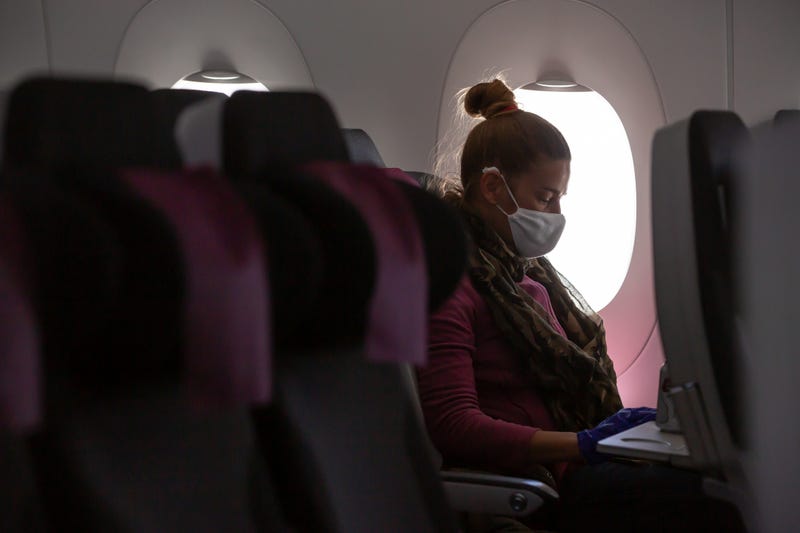
A recent court ruling may have nixed a federal mandate requiring passengers to wear masks on airplanes, but several experts from across the U.S. think travelers should continue masking up for now.
U.S. District Judge Kathryn Kimball Mizelle in Florida, an appointee of President Donald Trump, blocked the transportation mask mandate Monday. Even in the early months of the pandemic, many Republicans were skeptical about mask mandates, according to the Pew Research Center, and airline CEOs have even questioned the necessity of masks on airplanes.
Although Mizelle’s court order negates a Jan. 29 order requiring masks on public transit from the Centers for Disease Control and Prevention, it said this week that it “continues to recommend that people wear masks in indoor public transportation settings at this time.”
Additional information about recommendations are expected to be released soon.
“I’ll continue to follow CDC guidance & mask up on planes,” said White House Coronavirus Response Coordinator Dr. Ashish Jha in a tweet.
Why we should keep wearing masks
“You can quote me on this: I’m going to continue to wear an N95 mask,” said David Freedman, professor emeritus of infectious diseases at the University of Alabama at Birmingham, according to the Washington Post. “No question. You have no idea who’s on a plane.”
While the International Air Transport Association claims the flow of cabin air on planes makes the risk of contracting COVID-19 during a flight low, Freedman – who is president-elect of the American Society of Tropical Medicine and Hygiene – said airflow is most effective on an airplane when the engines are fully running. Passengers are still at risk of infection while in the airport, as they board planes and as they sit on the plane before and after it takes off.
“At least wear it [a mask] during the critical periods, which means before and after you’re in the air,” he said.
Freedman said he thinks everyone should continue to wear masks on planes, especially adults who are immunocompromised and children under five years old, who are too young to be vaccinated per the current U.S. Food and Drug Administration regulations. For children under two, the CDC also does not recommend masking.
“It really is the zero-to-2-year-olds that are in the toughest spot,” said Robert Wachter, chair of the department of medicine at the University of California at San Francisco “Until there are vaccines, if I had a little baby, I would not fly.”
Watcher said he was shocked by the judge’s decision. He would have preferred to see the mandate dropped in May, as long as there was not another COVID-19 surge.
“I think the threshold for a mandate has to be fairly high, and I think the situation changed enough, so it was reasonable to at least consider removing the mandate,” he said. “To have it be done by a judge rather than public health authorities just strikes me as wrong and a very dangerous precedent.”
There are currently concerns about the highly transmissible omicron BA.2 variant, which is the dominant COVID-19 variant in the U.S., potentially causing a surge. An outbreak of this variant has led to a lockdown and deaths in Shanghai, China.
As of April 13, the seven-day rolling average of COVID-19 cases increased by 19%.
“It’s not an ideal time right now,” said infectious-disease expert John Swartzberg, clinical professor emeritus at the University of California at Berkeley’s School of Public Health of the mandate block. Like Watcher, he finds the judge’s decision to block the mandate to be “problematic.”
“Wearing my hat as a physician and public health professor, I’m more chagrined that we’re putting people at risk while it’s unnecessary to do that,” he said. Swartzberg said those planning to travel should stay up to date on COVID-19 vaccination.
Wachter recommends wearing masks on airplanes and on public transit even though it is no longer government mandated.
How effective could they really be at preventing infection?
Leonard Marcus, director of the Aviation Public Health Initiative at the Harvard T.H. Chan School of Public Health, said masks can lower the risks of transmitting disease by roughly 50%.
“On an airplane, we’re in very, very close proximity to one another,” he said. “So therefore, continuing to wear masks is something I’m going to do and I would recommend others to do, especially if they want to avoid getting the disease.”
Could the mandate come back?
In a Tuesday press release, the Department of Justice said it plans to appeal the court’s decision to block the mask mandate.
“The Department of Justice and the Centers for Disease Control and Prevention (CDC) disagree with the district court’s decision and will appeal, subject to CDC’s conclusion that the order remains necessary for public health,” said the statement. “The Department continues to believe that the order requiring masking in the transportation corridor is a valid exercise of the authority Congress has given CDC to protect the public health. That is an important authority the Department will continue to work to preserve.”


